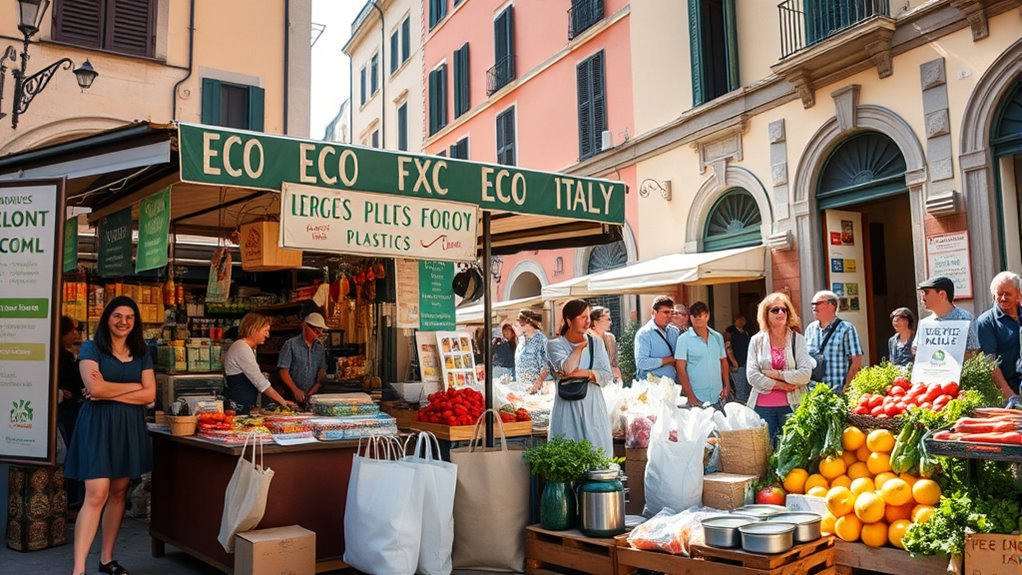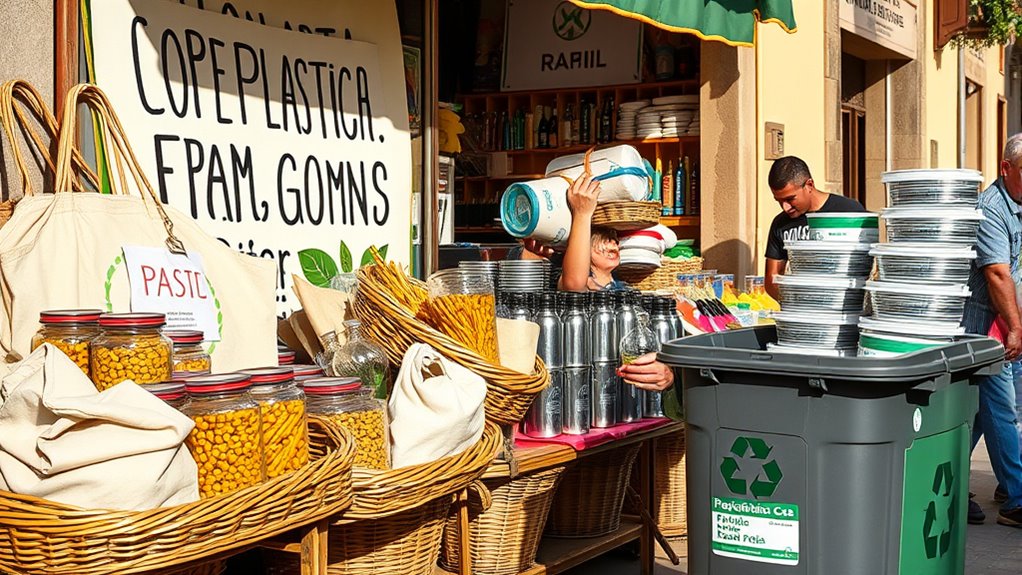Italy is actively tackling single-use plastics through strict recycling policies, public awareness campaigns, and incentives for sustainable choices. You’re encouraged to sort waste properly, use reusable alternatives, and support eco-friendly products. Businesses are also motivated to reduce plastic in their operations, while community efforts promote cleaner environments. By participating in these initiatives, you’ll help protect Italy’s ecosystems. To discover how these strategies work together for a greener future, keep exploring the steps Italy is taking.
Key Takeaways
- Italy promotes waste sorting and recycling policies to reduce single-use plastic waste and encourage reuse.
- Public awareness campaigns educate citizens on environmental impacts and promote alternatives like reusable bottles.
- Deposit-return schemes incentivize the recycling of plastic bottles and packaging.
- Regulations encourage businesses to eliminate single-use plastics and adopt sustainable practices.
- Community initiatives and educational programs foster responsible disposal and collective action against plastic pollution.

Plastic pollution has become one of the most urgent environmental challenges today, prompting communities and organizations worldwide to take action. Italy is no exception. Recognizing the detrimental effects of single-use plastics, the country has launched a variety of initiatives aimed at reducing plastic waste. Central to these efforts are recycling policies that encourage responsible disposal and reuse of plastics, along with campaigns that elevate public awareness about the importance of minimizing plastic consumption. These strategies work hand in hand to create a culture of sustainability that can considerably cut down on plastic pollution.
Italy’s recycling policies and awareness campaigns are key to reducing plastic pollution and promoting sustainability.
Your role in these initiatives is vital. When Italy implements stricter recycling policies, you’re encouraged to sort your waste properly, separating plastics from other materials. These policies often include incentives like deposit-return schemes for bottles, making recycling more convenient and appealing. By following these regulations, you help guarantee that plastics are properly processed and transformed into new products, reducing the demand for virgin materials. Public awareness campaigns play a pivotal role here—they inform you about the environmental impact of single-use plastics and motivate behavioral change. These campaigns use various channels, from social media to school programs, to spread messages that plastic pollution harms ecosystems, wildlife, and even human health.
You might notice that Italian authorities actively promote reusable alternatives, such as metal or glass bottles, and biodegradable packaging. These are part of a broader movement to shift consumer habits away from disposable plastics. As you become more aware of these issues, you’re more likely to make conscious choices—bringing your own bags, refusing plastic straws, or opting for products with minimal packaging. Public awareness initiatives often include community clean-up events and educational workshops, which you can participate in to deepen your understanding of plastic pollution’s impact and the importance of reducing your plastic footprint. Additionally, fostering digital literacy around environmental issues can help you access reliable information and make informed decisions about sustainable practices.
Italy’s approach also involves collaborating with businesses to reduce plastic use in their operations. Policies now encourage shops and restaurants to eliminate single-use plastics, replacing them with sustainable options. When you support these businesses, you reinforce the effectiveness of these policies and help accelerate the transition to greener practices. Ultimately, the success of Italy’s plastic reduction initiatives depends on your active participation. By adhering to recycling policies and embracing public awareness messages, you can contribute to a cleaner environment. Every small action, from properly sorting your waste to spreading awareness among friends, adds up. Together, these efforts can help Italy achieve its goal of markedly reducing single-use plastics, safeguarding natural landscapes and marine life for generations to come.
Frequently Asked Questions
How Effective Are Italy’s Current Plastic Bans?
Italy’s plastic bans are quite effective, as they boost recycling infrastructure and raise public awareness. By reducing single-use plastics, you’ll notice less waste in the environment and more support for sustainable habits. The bans encourage you to recycle more and choose eco-friendly options, creating a positive cycle. While challenges remain, these initiatives markedly contribute to Italy’s efforts to cut plastic pollution and promote a greener future.
What Are Italy’s Main Challenges in Reducing Plastic Waste?
You face a tangled web of challenges as Italy tries to cut plastic waste. Cultural barriers cling like stubborn vines, making change slow to take root. Enforcement challenges act like shifting sands underfoot, complicating efforts to guarantee compliance. Despite good intentions, you must navigate these obstacles to truly reduce plastic waste, requiring persistent effort and cultural shifts to break old habits and foster sustainable practices across communities.
How Do Italian Businesses Adapt to Plastic Reduction Policies?
You adapt to Italy’s plastic reduction policies by integrating corporate sustainability practices into your operations. You may switch to eco-friendly packaging, reduce single-use plastics, and promote recycling initiatives. As consumer awareness grows, you emphasize transparency and eco-conscious messaging to attract environmentally aware customers. This proactive approach not only helps comply with regulations but also strengthens your brand reputation, aligning your business with Italy’s broader efforts to combat plastic waste.
Are There Incentives for Consumers to Avoid Single-Use Plastics?
Imagine walking into a store and seeing vibrant eco labels on products, catching your eye as you’re rewarded with discounts or points for choosing reusable options. Italy offers such incentives, encouraging consumers like you to avoid single-use plastics through rewards programs and eco labeling. These initiatives make it easier and more appealing to make eco-friendly choices, turning everyday shopping into a way to protect the environment while earning benefits.
How Does Italy Collaborate With Neighboring Countries on Plastic Issues?
You benefit from Italy’s collaboration with neighboring countries through cross-border recycling efforts, which streamline waste management and reduce plastic pollution. Italy actively participates in regional policy harmonization to create consistent regulations across borders, making it easier for you to adopt sustainable practices. This cooperation promotes shared responsibility, enhances recycling infrastructure, and guarantees that plastic reduction measures are effective throughout the region, ultimately helping you contribute to a cleaner environment.
Conclusion
By paying close attention to Italy’s efforts, you can see how small changes make a big difference in protecting our planet. Embracing these initiatives, even in subtle ways, helps create a cleaner, greener future for everyone. Every mindful choice adds up, gently steering us away from harmful plastics and toward a more sustainable world. So, why not join the movement and be part of the positive ripple effect? Your simple actions can truly make a difference.









